AccessComputing News - January 2014
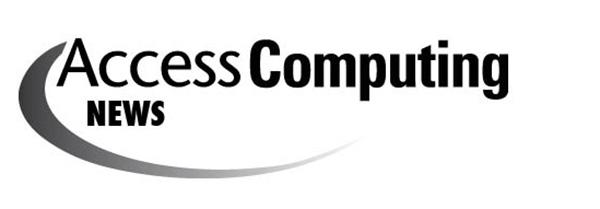
Led by the Department of Computer Science & Engineering and DO-IT (Disabilities, Opportunities, Internetworking, and Technology) at the University of Washington, AccessComputing is supported by the National Science Foundation (Grant No. CNS-0540615, CNS-0837508, and CNS-1042260). Any opinions, findings, and conclusions or recommendations expressed in this material are those of the authors and do not necessarily reflect the views of the National Science Foundation.
For further information, to be placed on the mailing list or to request materials in an alternate format, contact:
University of Washington
Box 354842
Seattle, WA 98195-4842
accesscomp@uw.edu
www.uw.edu/accesscomputing
206-221-4171 (Fax)
206-685-DOIT (3648) (voice/TTY)
888-972-DOIT (3648) (toll free voice/TTY)
509-328-9331 (voice/TTY) Spokane
Dr. Richard Ladner, PI
Sheryl Burgstahler, Co-PI
Below are the articles of the AccessComputing News - January 2014 newsletter. These articles can also be seen all on one page at the Full Newsletter option.
AccessComputing Supports Projects Nationwide (AccessComputing News - January 2014)
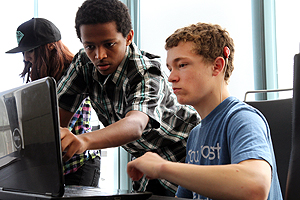
Since 2006, the Alliance for Access to Computing Careers (AccessComputing) has supported activities nationwide in order to increase the number of people with disabilities, including post-9/11 veterans, successfully pursuing computing careers. AccessComputing minigrant funds have been used to expand existing computing events to involve students with disabilities, create new stand-alone events designed to attract and support students with disabilities into computing fields, and support professional development opportunities.
For AccessComputing minigrant success stories, visit www.uw.edu/accesscomputing/get-involved/educators-employers/minigrants/projects-fundedminigrants.
Engage with AccessComputing (AccessComputing News - January 2014)
Students with disabilities:
- Internships
- E-mentoring
- AccessComputing Team
- Summer programs
Educators and employers:
- Host an intern
- Communities of practice
- E-mentoring
- Presentations
- Minigrants
New AccessComputing Resources (AccessComputing News - January 2014)
AccessComputing has just launched a redesigned website with a new look and feel as well as new navigation, search capability, content, and features.
The new Choose Computing
(www.washington.edu/accesscomputing/resources/why-choose-computing) area encourages high school students with disabilities to pursue computing and IT careers. There you’ll find profiles of successful computing students and professionals who happen to have disabilities, resources to learn more about careers in computing, and examples of computing projects.
With the new website, we’ve also launched our AccessComputing Replication Packages (www.uw.edu/accesscomputing/get-involved/educators-employers/replication-packages). These packages provide everything that educators or professionals need to replicate activities that have been successful at working towards AccessComputing’s goals of increasing the participation of individuals with disabilities. In addition, there is new improved searching capability in the Knowledge Base
(www.washington.edu/accesscomputing/knowledge-base).
Check it all out at www.washington.edu/accesscomputing/.
Summer Academy: Celebrating Seven Years of Success (AccessComputing News - January 2014)
The 2013 Community Premiere was a fitting end to the seventh and final year of the Summer Academy for Advancing Deaf and Hard of Hearing in Computing, where students from all over the United States came to Seattle to find out if a career in computing was the ticket to a great future.
As in past years, students from the 2013 Summer Academy met deaf and hard of hearing role models who are working in computing fields; visited computing companies in Seattle, such as Adobe, Google, Isilon, Microsoft, Tableau, and Valve; took a class in Animation; and participated in for-credit classes in programming. As part of the Community Premiere, three animation shorts that student teams made over an eight week period had their first public showing. Check out this and previous years’ animation shorts at www.uw.edu/accesscomputing/get-involved/students/resources/advancing-deaf-hard-hearing-computing/summer-academy-advancing-deaf-and-hard-hearing-computing/student-projects.
At the Premiere, the 2013 students also honored the Bill and Melinda Gates Foundation and the Johnson Scholarship Foundation for their support. And finally, in a surprise presentation orchestrated by Anna Cavender (who worked with the Summer Academy in its early years while she was a PhD candidate) and Katie Sullivan (AccessComputing member; see her bio in the January 2012 AccessComputing newsletter) presented an eighteen-page thank-you card signed by fifty-four Summer Academy alumni to Richard Ladner and Rob Roth, Director and Coordinator of the Summer Academy respectively. Here’s what the Alumni had to say:
“Thank you so much for all the support you’ve given me throughout the years, in Seattle, at RIT, and everywhere since then. I appreciate everything you’ve done with the Summer Academy program and am proud to have been a part of it.” - 2007 Alum Matt Starn, Microsoft
“The Summer Academy 2008 was one of the biggest roles in my life that has helped me to shape my career into the computer scientist that I am today. Thank you so much for the amazing opportunity to learn, strive, and succeed!” - 2008 Alum Daniel Steed Rochester Institute of Technology
“Without this opportunity, I wouldn’t have known which major to choose or where I want to work at in the future. I now know much more about the possibilities for success both in and after college. I appreciate what Summer Academy has done for the students including myself and for guiding students to have a clear view of their future career. Thanks!” - 2012 Alum Mahaed Mohamud, University of Washington
“I had never imagined that I could be able to share an experience with so many other deaf students, let alone learn advanced computer science and make an animated short story at the same time. The 2011 Summer Academy is one I’ll never forget!” - 2011 Alum Yongyi Chen, MIT
“Thank you for allowing me to grow academically as well as learning to adjust to college life. Without this opportunity I know I would not have ever considered computer science as something I could do and would probably also struggle in college. Thanks for the reality check.” - 2012 Alum Derek Lee, Stanford
“I am very grateful… for getting a chance to be a part of the Summer Academy. It helped foster my interest in computer science, and3I wouldn’t be the same person I am today if not for the amazing experience you guys made possible. Thank you again!” - 2011 Alum Matthew Seita, Rochester Institute of Technology
“There’s no way I could have had such a strong understanding of the computer science world if it had not been for this program. I had an absolute blast being able to enjoy Seattle with a wonderful group, and I really appreciated the networking you’ve made happen. This was my first dive into deaf culture as well, and I’ve learned so much about the culture I’ve missed out on. Thanks to this program, I now have new friends across the nation.” - 2013 Alum Samir Jain, Georgia Tech
“Thank you for providing us with this opportunity to explore the field of computing in a way that very few get to experience. I learned a great deal about programming and animation, as well as getting to be around a group of other deaf/HoH teens for the first time in my life.” - 2012 Alum Debra Diepenbrock, Oklahoma Christian University
“Thank you for your amazing program that you have offered me and to other students. It was a wonderful experience, and I know I have grew so much from it. This academy was a life changing experience and I’m glad I was a part of it. Thank you so much again for creating this program and please know that you have made a difference in my life.” - 2009 Alum Sarah McGough, University of Texas, Austin
“Rob and Richard, I am grateful for such a unique experience in a Deaf-friendly environment, which I have never been a part of before. I have learned and grown so much during Summer Academy, and I do not regret my time there. Thank you for providing amazing resources, opportunities, and friendships! Your tireless work made all that possible in just nine weeks, and years for many of us.” - 2013 Alum Jessie Zhang, University of Washington
Student Profile: Dan (AccessComputing News - January 2014)
My name is Daniel Mooney, and I am currently a fourth-year (senior) student at Rochester Institute of Technology (RIT), in Rochester, New York. My major is information technology with an emphasis on mobile and web applications. I anticipate graduating this May. Following my graduation, I will be working as a technology analyst for Bank of America Merrill Lynch’s Global Technology and Operations Division.
I chose RIT due to its strong emphasis in technology, job placement, and services for the deaf. I attended AccessComputing’s Summer Academy for Advancing Deaf and Hard of Hearing in Computing in 2011 and, through the Summer Academy, became very interested in web applications. Following that summer, I became a student tutor for the National Technical Institute for the Deaf computer lab for deaf and hard of hearing computer science students. The lab supervisor, Mark Wambach, hired me in the summer of 2012 as the developer for a web application that analyzed self-submitted student hours versus grade achievement. Through the summer work experience, I learned how to manage my own projects and focused my career interest towards web development.
For my last co-op in summer 2013, I was looking for an internship at a major corporation so that I could experience working within a business setting. I applied through the Emerging Leaders program at the National Business & Disability Council and was rewarded with an internship analyst position with Bank of America Merrill Lynch’s Global Technology and Operations Division. My duties were to facilitate syncing data on municipal bond rates across many different type of databases, manage the data so the queries could be performed at optimized capacity, and educate my team on the intricacies of Python’s memory management. Following the internship, I landed a full-time offer which I have since accepted.
In the fall of 2013, I went back to RIT to complete my senior year and further my unique interest in developing applications for business and information systems. I also joined MotionSavvy, a technology start-up concentrating on capturing sign-language through 3-D recognition hardware and software. As my career will begin in the financial service technology industry, I have expanded my interests to other types of web-based businesses.
CBI and Disability Awareness Conference at New Mexico State University (AccessComputing News - January 2014)
A Capacity Building Institute (CBI) and Conference were held at the New Mexico State University (NMSU) Corbett Center Ballrooms on October 1-2, 2013. The event was a collaborative effort from the NMSU Provost’s office, Project Enable, the NMSU Student Accessibility Services Office, and AccessComputing. Forty participants attended, representing several different departments on campus, ranging from General Counsel to the Research Library.
The first day of the event consisted of presentations about accessible technology and universal design, as well as a student panel and keynote talk. On the second day, several local and on-campus service providers were invited to present on the services they provide and how they can support the faculty and staff of NMSU.
Featured speakers included Sheryl Burgstahler and Richard Ladner from AccessComputing, Cody Unser from the Cody Unser First Step Foundation, Jim Parker from the New Mexico Governor’s Commission on Disability, and representatives from the Student Accessibility Services Office and the Military and Veterans Services Office. Panels and presentations afforded an opportunity for faculty and staff at NMSU to learn how they can improve the campus. Perhaps the biggest effect from this event is a greater connectedness between service providers, students, faculty, and staff. Several programs on campus have started plans to make this conference a regular event on the NMSU campus.
Universal Design in Curriculum a Key Focus at Accessing Higher Ground (AccessComputing News - January 2014)
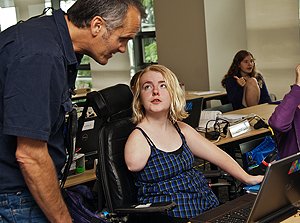
The Accessing Higher Ground conference, held annually in November, focuses on accessible media, web, and technology in higher education. It attracts about 300 attendees, most of whom play key roles in assuring their college or university’s programs, services, and resources are accessible to students with disabilities, especially when delivered using technology.
In 2013, the theme of the conference was “universal design in curriculum.” Universal design is the practice of designing something —a building, website, device, product, or lesson plan —with a full spectrum of users in mind. This increases the likelihood that people with a wide variety of characteristics (e.g., variations in vision, hearing, use of hands, height, mobility, language, culture) will be able to use the product.
“Universal design in curriculum” is distinct from “universal design of curriculum.” The former is concerned with teaching principles of universal design by injecting related content into course curricula; the latter ensures course content is fully accessible to students with a wide variety of characteristics, including various disabilities and learning styles.
It is important for curricula to be accessible to all learners, but it also important to teach principles of universal design because today’s students are the architects of our future world. If they are exposed to universal design and accessibility related concepts, it increases the likelihood that the world they create will be one in which all people can equally participate. This has been an area of focus for AccessComputing, so naturally program staff and partners were active participants at the conference.
In an all-day preconference session, I was joined by several colleagues in facilitating a pre-conference workshop titled “Integrating Universal Design into the University Curriculum.” Each of the facilitators delivered a presentation exploring the topic from slightly different perspectives, then spent much of the afternoon engaged in discussion with participants about issues and solutions.
AccessComputing partner Jonathan Lazar of Towson University kicked off the day with a lively introduction to the topic and offered specific recommendations for how one might integrate accessibility related content into specific courses, including human-computer interaction, web design, systems analysis and design, and software engineering. He also encouraged participants to reach out to other disciplines including instructional technology, special education, design, engineering, speech pathology, occupational therapy, and many more. If universal design is successfully integrated into courses across multiple disciplines, students’ understanding of this content will be reinforced and students will be more likely to apply this understanding in their future careers.
Dr. Lazar also stressed the importance of building universal design into standard curriculum models such as those coordinated by the Association for Computing Machinery (ACM), Association for Information Systems (AIS), and Institute of Electrical and Electronics Engineers (IEEE). Most of the current curriculum models have little or no content related to universal design or accessibility. There is an urgent need for faculty members and others who are involved in these organizations to help address this gap.
The University of Dundee provides a positive example of one institution that has successfully integrated universal design (or “inclusive design,” as it’s known in Scotland) into computing courses at both the undergraduate and graduate levels. David Sloan, formerly with the University of Dundee but now with The Paciello Group, shared some of the sample curricula, learning activities, and assessment strategies that comprise “The Dundee Approach.”
E.A. Draffan of the University of Southampton shared her experiences involving a full course on assistive technology and universal design that is taught to students who are pursuing a master of science degree in web technology. Up to fifty students each year take the course, and there are many success stories. Students’ ideas and projects have led to actual products and services that increase access for individuals with disabilities, and many of the students have gone on to pursue PhDs researching accessibility and universal design.
In my presentation, I described the web design and development course curriculum recently updated and maintained by AccessComputing. The curriculum was primarily designed for use in secondary schools, but has been used in a wide range of settings from middle school through universities. It is a full course curriculum in which conforming to web standards and accessible design are taught as core design principles in the first unit, then reinforced throughout the course as students learn new topics. The curriculum is available for free at www.uw.edu/accesscomputing/webd2 and currently has over 4000 registered teachers worldwide. Many of the teachers who use it have disclosed that they’re relatively new to web design, so they are learning web design at the same time they’re teaching it. Since universal design is integrated into the course, they’re learning the proper way to create web pages and passing that on to their students.
Howard Kramer of University of Colorado at Boulder is the organizer of Accessing Higher Ground, and he joined the pre-conference session to talk about a grant he received from the National Endowment for the Arts to promote the integration of universal design into university curricula. This project is young, but ultimately will host a clearinghouse of syllabi and course components that address universal design, plus other resources that faculty and others can share. The project website (still under construction at the time of this writing) is at www.uduc.org.
And all that was only the pre-conference session! Each of the facilitators went on to give breakout sessions during the regular conference and were joined by several other presenters who shared their ideas and experiences. David Sloan expanded on The Dundee Approach during the first keynote luncheon, and E.A. Draffan and I participated in a panel discussion during the second keynote luncheon.
A web page documenting ideas and sharing resources from the pre-conference session can be found at www.staff.washington.edu/tft/talks/ahg13/ud. The full Universal Design Track and Schedule is documented on the conference website at www.accessinghigherground.org/UDTrack2013.html.
Student Profile: Kavita (AccessComputing News - January 2014)
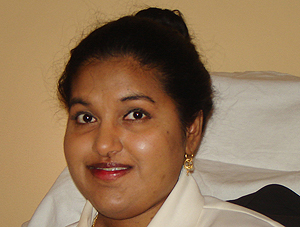
My name is Kavita. I am a PhD student in computer science at the University of Maryland, Baltimore County (UMBC) and I plan on graduating in 2015. I earned my bachelor’s degree in computer science and mathematics from UMBC. I conduct research that increases independence for people with disabilities and impacts the field of human robot interaction. Specifically, I work on the design and development of a robotic system to assist people with disabilities in their daily lives. I may not achieve all of my research goals before I finish my PhD, but I look forward to continuing to work on them throughout my career.
I have the motor neuron disorder called spinal muscular atrophy. Due to the severity of my disability, I am only able to move the index finger of my right hand. With my index finger, I have the ability to use a computer with a trackball mouse and an onscreen virtual keyboard with word prediction. Studying computing with a disability is difficult; however, it is possible to succeed with the help of campus support services and professors focus on your individual needs and accommodations. In my own experience, Student Support Services at UMBC has helped me effectively communicate with professors, arrange extended time to submit course work, attend classes remotely via Skype, and secure electronic books.
I am passionate about computing because it allows me to maximize my potential without being hindered by my physical limitations. The field is highly accessible and accommodations are easy to implement if accessibility ever becomes an obstacle. Additionally, computing allows me the opportunity to contribute to assistive technology development that may help maximize the potential of other people with disabilities like mine.
After graduate school, I am interested in conducting research and teaching. I want to emphasize the importance of an inclusive environment for all by conducting academic research. I hope to advance technology development and increase diversity as a leader in computing, accessibility, and robotics. I want to increase the active participation of underrepresented minority groups in the community locally, nationwide, and internationally via research, especially people with disabilities, in order to improve their quality of life.
Discovery Retreat: Exploring STEM with Video (AccessComputing News - January 2014)
What do you get when you combine 30 deaf and hard of hearing high school students, a half-dozen challenging STEM topics, and GoPro cameras? A weekend of STEM exploration and creativity!
Twice a year the Educational Resource Center on Deafness (ERCOD) at Texas School for the Deaf in Austin, Texas invites deaf and hard of hearing students from all over Texas to come together for a weekend of exploration in collaboration with deaf and hard of hearing professionals. This past November, a group of eleventh and twelfth graders spent the weekend exploring STEM (Science, Technology, Engineering, Math) topics such as encryption, binary search, sound visualization, and robotics, and then creating a short video explaining their topic.
Austin Andrews and Jeremy Weston, creators of the KnowThat?! ASL video series, introduced the students to the concept of using various constraints to enhance their creativity. Time, equipment, and computer resources were limited for this project but these constraints did not limit the boundaries for their creativity.
The goal for the weekend was to produce a four-minute video explaining their STEM topic that could be understood by the general public without audio or any knowledge of sign language. Bradley Gantt, a deaf professional videographer, guided the students through the fundamentals of developing, shooting, and editing a short video with help from a number of other deaf professionals. Each group of five students was assigned a different STEM topic, and an adult group leader helped the students explore the topic and develop the video.
The STEM topics were new and unfamiliar ground for most of the students but with teamwork and guidance they welcomed the challenges. They learned the basics of encryption, binary searches, and programming robots and developed videos explaining their newfound knowledge. By Sunday morning all the groups had their videos ready to post online and share with the world.
The students packed a lot of learning, hard work, and fun into one weekend. As one student commented: I enjoyed the process of working together as a team; we all had our responsibilities, such as researching, filming, editing and managing the team.
See what a group of teens can accomplish on a weekend when you give them some new toys and a dash of inspiration —check out their videos here.
New Video on Captioning Available (AccessComputing News - January 2014)
AccessComputing announces a new video, Communication Access Realtime Translation (CART) Services for Deaf and Hard-of-Hearing People, that explores what CART is and where it can be used. The video is ideal for anyone who is deaf or hard of hearing and is considering what types of accommodations would be best for participating at a college-level class or at a conference.
The video was developed after it was discovered that few, if any, resources were available on the Internet to explain what CART and other captioning systems were. Four students from the Summer Academy for Advancing Deaf and Hard of Hearing in Computing, including two ASL signers, speak about why they chose captioning within a STEM educational setting. This video will be available in February 2014 at www.uw.edu/accesscomputing/get-informed/videos.
ACM SIGACCESS International Conference on Computers and Accessibility (AccessComputing News - January 2014)
The fifteenth ACM SIGACCESS International Conference on Computers and Accessibility (ASSETS 2013) was held October 21–23, 2013 in Bellevue, Washington, just across Lake Washington from Seattle. The ASSETS conference is a major forum for research in the design, evaluation, and use of computing and information technologies to benefit people with disabilities and older adults.
More than 160 people attended the conference. There were twenty-seven papers, forty posters, and eight demonstrations that were accepted to the conference by a rigorous peer review. Of particular interest were two new events at the conference: experience reports and a user experience panel. The two experience reports were about first-hand experiences by users of technologies intended for them. The user experience panel consisted of three non-researcher individuals with disabilities who were asked about their experiences with technology and what they would like to see in the future.
At least twelve people with disabilities attended the conference, half of them graduate students, and many of them speakers. Sign language interpretation was available throughout the conference and some limited captioning was also available. The hotel in Bellevue was chosen in part because of its accessibility features. It was great to see technical talks by several current and past AccessComputing team members. The next ASSETS conference will be in Rochester, New York, October 20–23, 2014.
Capacity Building Award: Sapna Prasad (AccessComputing News - January 2014)
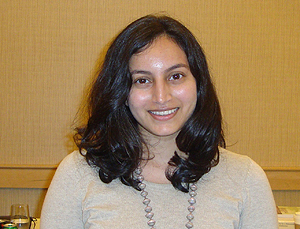
Sapna Prasad, Research and Education Specialist at Landmark College Institute for Research and Training, has been given AccessComputing’s Capacity Building Award.
Through her participation with AccessComputing, Sapna has collaborated with several partners on activities, including workshops with the University of Maryland Baltimore County and Southern Illinois University Edwardsville. In spring 2013, Sapna helped to organize an AccessComputing Capacity Building Institute (CBI) at Landmark College focused on computing students with invisible disabilities that was attended by postsecondary faculty, disability service providers, and instructional technology personnel from multiple colleges and universities. Proceedings from the CBI are available online at www.uw.edu/accesscomputing/get-informed/publications#institutes.
Accessibility at CHI (AccessComputing News - January 2014)
ACM’s Special Interest Group on Computer-Human Interaction (SIGCHI) is the world’s largest organization dedicated to the study of how humans interact with interactive technologies. Since 2011, the SIGCHI Executive Committee has been discussing ways to become more inclusive of researchers and practitioners with disabilities. Two complementary forces have driven this initiative: members of the SIGCHI Executive Committee recognized that the SIGCHI community could be more inclusive of practitioners and researchers with disabilities and that improvements were possible, and a number of SIGCHI community members with disabilities began documenting and actively sharing areas where improvements could be made.
Some first steps have been made to address accessibility issues. In consultation with AccessComputing and with ACM SIGACCESS, two general categories of accessibility consideration emerged as key, but separate, issues. The first is digital accessibility (relating to websites and digital resources). The second is physical accessibility (relating to conference locations, hotels, and giving presentations).
Preliminary steps have been taken to improve accessibility of both digital accessibility and physical accessibility for all SIGCHI-related conferences and to create channels of communication between SIGCHI members and non-SIGCHI interested parties (e.g., conference attendees, researchers and practitioners in related fields).
Three concrete steps have been taken to facilitate communication, raise awareness of issues and increase informed representation and advocacy of inclusive practices: (1) before SIGCHI’s flagship conference in 2013, the ACM SIGCHI Conference on Human Factors in Computing Systems, better known as “CHI”, a new email alias was created, focused specifically on reporting problems related to accessibility at the conference (sigchi-accessibility@listserv.acm.org). This email list was announced online through our email distribution lists and introduced at the Town Hall meeting at the conference itself; (2) questions related to accessibility experience at the CHI 2013 conference were added to the post-conference survey; and (3) the CHI 2014 conference chairs have created two new positions on the conference committee to represent the two key accessibility areas identified: digital accessibility chair and physical accessibility chair.
In addition to communication and representation, action has been taken. With regard to digital access, the digital accessibility chair has focused on the accessibility of the CHI 2014 web site, the CHI 2014 mobile app, and the formatting of digital library submissions (CHI papers). AccessComputing staff has been centrally involved in these efforts.
With regard to physical access, CHI 2014 online submission forms have been modified to explicitly request that authors of accepted papers and notes indicate whether presenters attending the conference will need any type of disability related accommodations. Further, in conducting site selection, SIGACCESS-developed checklists for assessing conference and hotel facilities were adopted by the SIGCHI Conference Management Committee.
While improving the inclusiveness of SIGCHI is a long-term goal, AccessComputing has worked with SIGCHI to make progress towards that goal.
AccessComputing Student Internships (AccessComputing News - January 2014)
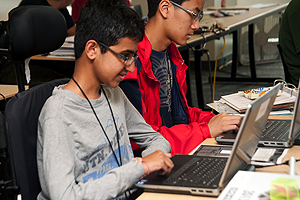
AccessComputing has funded over 140 internships for students with disabilities to work on research as well as lab, technical support, and other computing projects. Through these experiences, students have learned how to request reasonable accommodations, communicate with supervisors and co-workers, collaborate with others, and manage priorities.
Students who have participated internships have told us:
- “I am applying to graduate school, so I had a preview of what research will be like.”
- “I learned how to work independently on a complicated project, and how to adapt my work to suit my disability needs.”
- “Because of my Asperger’s syndrome, interviewing was a major obstacle in my job search. The internship allowed me to develop my social skills.”
- “I learned what it was like to actively write, improve, problem solve, and troubleshoot a program for the first time, while also learning how to communicate and explain my ideas to others.”
- “The main thing I learned was being an integral part of a team, as well as being able to contribute to the team’s goals. I also learned more of the hardware and user-end aspects of computer science.”
- “My internship...gave me valuable, real-world experience that I could not have gained from college courses.”
- “Despite being visually impaired, I can continue to work toward a degree in software engineering. My confidence level has increased along with my determination.”
- “I learned many soft skills (teamwork, time management, presentations) as well as technical skills.”
- “I learned the importance of writing code that can easily be read and understood by other programmers.”
- “I learned how to design a complex website from scratch with little to no assistance.”
Research projects include:
- developing a methodology to measure network performance for mobile devices
- creating a bioinformatics project to implement replica-exchange molecular dynamics
- developing an accessible viewing device for deaf and hard-of-hearing students to use in the classroom
Paid interns include:
- a motion capture intern who worked at a museum focusing on science, technology, and art
- a web development intern who created an online learning tool
- an accessible technology (AT) intern who provided information on AT to clients
AccessComputing has limited funds to support internships for members of the AccessComputing Student Team. Team Members also participate in mentoring and receive support from AccessComputing staff. Visit www.uw.edu/accesscomputing/get-involved/students/join-accesscomputing-team for more information and an application.